Governance of tenure newsletter
National workshops in Liberia, China and Malawi
Recent workshops in Liberia, China and Malawi on the Voluntary Guidelines follow those already held this year in Niger, Senegal and Sierra Leone. The detailed vacancy announcement is available here:
Liberia
 16-19 June, Monrovia hosted the first of a series of three national workshops with about 100 national and international participants, representing all stakeholder groups in Liberia. It was co-organized by the Liberia Land Commission and FAO, and supported with funding from Germany. The workshop served to raise awareness of the Voluntary Guidelines and provided a forum for cross-sectorial discussions on what is needed to implement tenure policies and reforms. Recommendations were made for the next phases of work in Liberia, and several participants from Government, civil society and academia committed to incorporating the Voluntary Guidelines in their ongoing campaigns to educate people about their tenure rights and responsibilities. The workshop contributed to the overall aim of the series of workshops by providing opportunities to increase the ability of the Government and citizens to understand, administer, secure and transfer tenure rights, in accordance with the principles of the Voluntary Guidelines.
16-19 June, Monrovia hosted the first of a series of three national workshops with about 100 national and international participants, representing all stakeholder groups in Liberia. It was co-organized by the Liberia Land Commission and FAO, and supported with funding from Germany. The workshop served to raise awareness of the Voluntary Guidelines and provided a forum for cross-sectorial discussions on what is needed to implement tenure policies and reforms. Recommendations were made for the next phases of work in Liberia, and several participants from Government, civil society and academia committed to incorporating the Voluntary Guidelines in their ongoing campaigns to educate people about their tenure rights and responsibilities. The workshop contributed to the overall aim of the series of workshops by providing opportunities to increase the ability of the Government and citizens to understand, administer, secure and transfer tenure rights, in accordance with the principles of the Voluntary Guidelines.
China
 Some 90 people, representing all stakeholder groups in China, participated in a national workshop in Beijing during 22-25 June. The workshop was organized by the Government of the People's Republic of China, and in particular the Ministry of Food and Agriculture and the Chinese Academy of Agriculture Sciences, in partnership with FAO. It raised awareness of the Voluntary Guidelines and promoted discussion on how they can be used to improve the governance of tenure of land, fisheries and forests in China. The participants explored challenges and opportunities, including priority areas and key roles for stakeholders. A second national workshop will provide a forum to explore the way forward regarding large-scale rural land registration in the context of the Voluntary Guidelines.
Some 90 people, representing all stakeholder groups in China, participated in a national workshop in Beijing during 22-25 June. The workshop was organized by the Government of the People's Republic of China, and in particular the Ministry of Food and Agriculture and the Chinese Academy of Agriculture Sciences, in partnership with FAO. It raised awareness of the Voluntary Guidelines and promoted discussion on how they can be used to improve the governance of tenure of land, fisheries and forests in China. The participants explored challenges and opportunities, including priority areas and key roles for stakeholders. A second national workshop will provide a forum to explore the way forward regarding large-scale rural land registration in the context of the Voluntary Guidelines.
Malawi
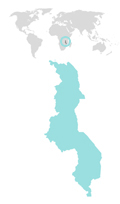 A workshop on the Voluntary Guidelines was held in Malawi from 14-16 July to create awareness and discuss ways to effectively carry out national implementation. The seminar – supported by the Swedish International Development Agency (SIDA) – was organized by the Ministry of Land, Housing and Urban Development in partnership with FAO and targeted a range of state and non-state actors involved in the tenure of land, fisheries and forests. The majority of Malawians depend on access to farmland and rangeland, fisheries and forests for their livelihoods and the way the Government of Malawi and society manage these resources has a direct impact on food security, poverty alleviation, economic growth and environmental sustainability. Different groups of stakeholders demonstrated their commitment to the Voluntary Guidelines through their active participation throughout the three days. Among others, Government policy-makers and officials and representatives of the private sector, civil society, academia and farmers’ associations made individual commitments to further engage in implementing the Voluntary Guidelines, and to act on the workshop’s recommendations by working together to increase the awareness of Malawians of tenure governance. Read more about the workshop on the FAO Regional Office for Africa website: http://www.fao.org/africa/news/detail-news/en/c/239093/
A workshop on the Voluntary Guidelines was held in Malawi from 14-16 July to create awareness and discuss ways to effectively carry out national implementation. The seminar – supported by the Swedish International Development Agency (SIDA) – was organized by the Ministry of Land, Housing and Urban Development in partnership with FAO and targeted a range of state and non-state actors involved in the tenure of land, fisheries and forests. The majority of Malawians depend on access to farmland and rangeland, fisheries and forests for their livelihoods and the way the Government of Malawi and society manage these resources has a direct impact on food security, poverty alleviation, economic growth and environmental sustainability. Different groups of stakeholders demonstrated their commitment to the Voluntary Guidelines through their active participation throughout the three days. Among others, Government policy-makers and officials and representatives of the private sector, civil society, academia and farmers’ associations made individual commitments to further engage in implementing the Voluntary Guidelines, and to act on the workshop’s recommendations by working together to increase the awareness of Malawians of tenure governance. Read more about the workshop on the FAO Regional Office for Africa website: http://www.fao.org/africa/news/detail-news/en/c/239093/
News on other relevant Guidelines
Adoption of guidelines on Securing Small-scale Fisheries
On 10 June 2014 in Rome, member states at FAO’s Committee on Fisheries endorsed the Voluntary Guidelines for Securing Small-scale Fisheries in the Context of Food Security and Poverty Eradication. The small-scale fisheries guidelines complement the Voluntary Guidelines on tenure. They are designed to support the world's millions of small-scale fishers, particularly in developing countries, by promoting their human rights and safeguarding the sustainable use of the fishery resources they depend upon for their livelihoods.
Upcoming negotiations on Agenda for Action for Addressing Food Insecurity in Protracted Crises
CFS will hold negotiations on the Agenda for Action (“A4A”) during 29 July to 1 August at FAO Headquarters. The First Draft, which serves as the basis for negotiations, refers to the Voluntary Guidelines in its Principle 5, which addresses tenure in the context of protracted crises.
Second round of negotiations on the Principles for Responsible Investments in Agriculture
The negotiations on the Principles for Responsible Investment in Agriculture and Food Systems continue during 4-8 August. They will be led by CFS at FAO headquarters. During the first round in May, the negotiations identified the Voluntary Guidelines as providing the framework for its Principle 5, which addresses the tenure aspects of responsible agricultural investments.
10 year anniversary of the Right to Food guidelines
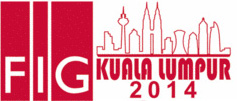 This year marks the 10th anniversary since the FAO Council adopted the Voluntary Guidelines for the Progressive Realization of the Right to Adequate Food in the Context of National Food Security. On 3 July, a technical dialogue was held as one of the steps to assess the achievements, the challenges and the key lessons learned during the past 10 years. The Voluntary Guidelines on tenure have become an important focus of the implementation of tenure aspects of the guidelines on the Right to Food.
This year marks the 10th anniversary since the FAO Council adopted the Voluntary Guidelines for the Progressive Realization of the Right to Adequate Food in the Context of National Food Security. On 3 July, a technical dialogue was held as one of the steps to assess the achievements, the challenges and the key lessons learned during the past 10 years. The Voluntary Guidelines on tenure have become an important focus of the implementation of tenure aspects of the guidelines on the Right to Food.
Happy Anniversary to the Voluntary Guidelines
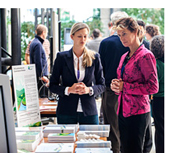 The second anniversary of the Voluntary Guidelines was marked on 14 May 2014 at a meeting and “sharefair” organized by the Committee on World Food Security (CFS), FAO and IFAD. The meeting, chaired by the CFS chair Gerda Verburg, presented steps being taken to apply the Voluntary Guidelines in Guatemala, the Philippines and Sierra Leone. Civil society representatives included the Indigenous Indian Treaty Council and the private sector was represented by the Coca-Cola Company. Questions for the panelists were sent by Twitter or email. The meeting was webcast and can be accessed here (available in English):
The second anniversary of the Voluntary Guidelines was marked on 14 May 2014 at a meeting and “sharefair” organized by the Committee on World Food Security (CFS), FAO and IFAD. The meeting, chaired by the CFS chair Gerda Verburg, presented steps being taken to apply the Voluntary Guidelines in Guatemala, the Philippines and Sierra Leone. Civil society representatives included the Indigenous Indian Treaty Council and the private sector was represented by the Coca-Cola Company. Questions for the panelists were sent by Twitter or email. The meeting was webcast and can be accessed here (available in English): ![]() The Sharefair provided an opportunity for organizations to share information on their activities on the Voluntary Guidelines and to strengthen partnerships. E-learning modules, videos and other capacity development and communications tools were highlighted.
The Sharefair provided an opportunity for organizations to share information on their activities on the Voluntary Guidelines and to strengthen partnerships. E-learning modules, videos and other capacity development and communications tools were highlighted.
2. SUPPORT FOR THE VOLUNTARY GUIDELINES
Cargill and Nestlé lend their voices in support of the Voluntary Guidelines
Support from the private sector continues to grow as Cargill and Nestlé added to the earlier commitments from the Coca-Cola Company and PepsiCo. Cargill Inc., one of the largest agriculture multinational corporations in the world, recently committed to demonstrating its support to the Voluntary Guidelines in its global business transactions. The announcement states that: “Cargill supports government efforts around the world to clarify land tenure and property rights, and promote good land governance as we believe this is critical to agricultural and rural development and investment, all of which contributes to stability, poverty reduction and increased food security”. Read the statement by Cargill: http://www.cargill.com/news/issues/agricultural-development/land-rights/index.jsp
On 9 July, Nestlé announced its support to the Voluntary Guidelines through its Commitment on Land and Land Rights in Agricultural Supply Chains. Nestlé, one of the world’s largest food and beverage companies, made the announcement in Brussels, Belgium, at a technical seminar for the private sector that was hosted by the European Commission and organized by FAO. The seminar provided information on how the private sector can use Voluntary Guidelines, with specific emphasis on addressing risks related to investments that affect tenure rights and on responding to opportunities.
Read the statement by Nestlé: http://www.nestle.com/asset-library/documents/library/documents/corporate_social_responsibility/nestle-commitment-land-rights-agriculture.pdf
3. STORIES FROM THE FIELD: USING THE VOLUNTARY GUIDELINES
Supporting the implementation of the Voluntary Guidelines by using LGAF
One approach to improving the governance of tenure in countries is to carry out initial assessments in order to identify gaps and priorities. A tool that is commonly used to make assessments is the Land Governance Assessment Framework (LGAF), which was developed by a consortium of organizations and is led by the World Bank. Assessments using LGAF have been completed or are ongoing in over 50 countries. A methodology has been developed by FAO to determine to what extent and how LGAF can be used to support the implementation of the Voluntary Guidelines. The LGAF results for Georgia, Moldova, the Philippines and Ukraine were used to test the methodology, and the work led to a number of findings and recommendations. Read more about the study: Link Priorities in improving governance of tenure and the ongoing initiatives were presented at an e-learning session on 2 July by FAO, UN Economic Commission for Europe, Georgia and Ukraine. Follow the Link.
A similar online e-learning session was organized in Russian on 10 June. Follow the session: ![]()
4. TECHNICAL PUBLICATIONS AND E-LEARNING
Now available online: E-learning course on tenure disputes and conflicts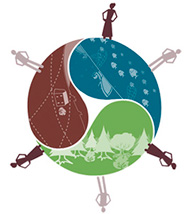
A new e-learning course on addressing disputes and conflicts over tenure rights is now available online in English. The course provides guidance on managing competition over the use of land, fisheries and forests and introduces a process for analyzing the underlying causes of disputes and conflicts. Additionally, it illustrates a range of dispute resolution mechanisms and options for policy and legal reforms to prevent disputes and reduce vulnerability to conflict. EN This course adds to the introductory course on responsible governance of tenure, which is available in English, French and Spanish. EN | FR | SP
Development of the Voluntary Guidelines as seen by stakeholders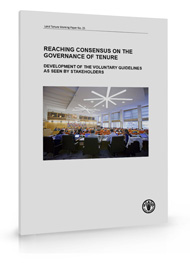
The perspective of stakeholders on reaching a common understanding of responsible practices of the governance of tenure is presented in a new Working Paper. The Voluntary Guidelines represent the greatest extent of “common ground” on governance of tenure that has been found to date in a global forum. This consensus was developed through intergovernmental negotiations with the participation of civil society, the private sector and research and academic institutes. The paper draws on interviews to identify how people engaged in the process and the dynamics that were created between the parties.
Now available in French: Respecting Free, Prior and Informed Consent
The technical guide on Respecting free, prior and informed consent (FPIC) is now available in French as well as English and Spanish. The guide sets out practical actions to respect and protect FPIC and it shows how Government agencies, civil society organizations, land users and private investors can comply with their responsibilities in relation to FPIC. EN | FR | SP
